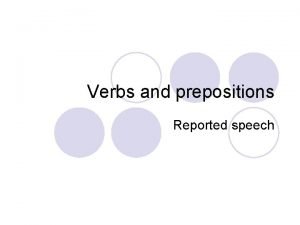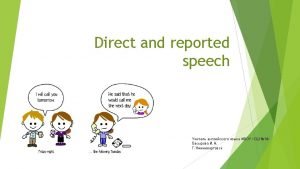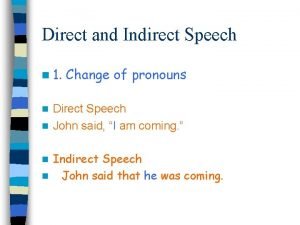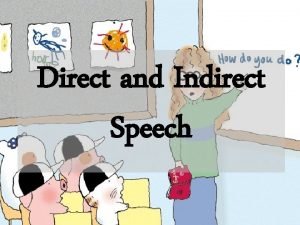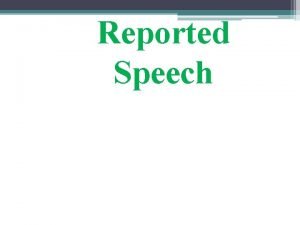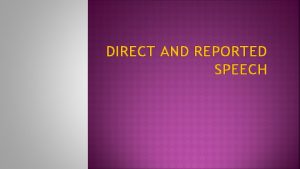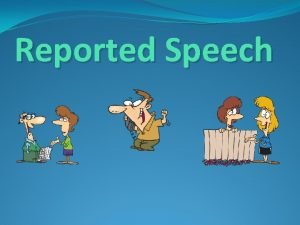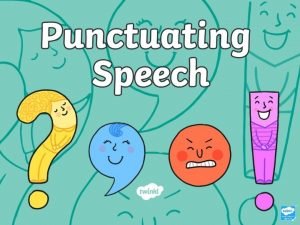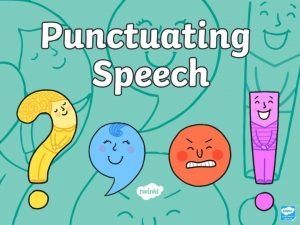Direct speech and Reported speech Nikola Haldekov Language










- Slides: 10

Direct speech and Reported speech Nikola Haládeková

Language review 1. 2. 3. 4. 5. 6. 7. Direct speech Reported speech From direct speech to reported speech Pronouns of Direct and Indirect speech Adverbs of time and place Exercise 1 Exercise 2

DIRECT SPEECH is used to give the exact words used by another speaker. n The words are given between quotation marks (" ") in writing: n I LOVE CHOCOLATE. She said: , , I love chocolate: “ n EG:

REPORTED SPEECH n is used to communicate what someone else said, but without using the exact words. n The tenses of the verbs are often changed. He said that he was going to come. (The person's exact words were "I'm going to n EG: come. ") n REPORTING VERBS: say - He said that. . . tell - He told me that. . .

Direct speech Indirect (reported) speech Present simple I work. . she worked. Present cont. You are working. . you were working. Past simple I worked. . she had worked. Past cont. They were working. . they had been/were working. Pres. perf. simp. I have worked. . she had worked. Pres. perf. cont. I have been working. . she had been working. Past perf. simp I had worked. . she had worked. Past perf. cont I had been working. . she had been working. Future simple I will/shall work. . she would work. Future cont. I will/shall be working. . she would be working. Future perf. sim I will/shall have worked. . she would have worked. Future perf. con I will/shall have been working. . she would have been working.

Pronouns DIRECT SPEECH I / me / my INDIRECT SPEECH You / your He, she /him, her/ his, her I, we / me, us / my, our We / us / our They / them / their This / these That / those

Adverbs of time and place DIRECT SPEECH INDIRECT SPEECH Here Now Today There Then, immediately That day Tonight Tomorrow Yesterday That night The next / following day The day before, the previous day Before That morning / week The night / month before The next / following week Ago This morning / week Last night / month Next week / year

Exercise 1 I´m living in Bratislava now. Charlie said that he was living in BA now. I saw Helen at a party in June and seemed fine. He said that he had seen Helen and she had seemed fine. I haven´t seen Diane recently. He said that he hadn´t seen Diane recently. My car was stolen a few weeks ago. He said that his car had been stolen a few weeks ago. I will tell Ann I saw you. He said he would tell Ann he had seen me.

Exercise 2 n n n n n Samira said, "Monica speaks English very well. " Samira said that Monica spoke English very well. Gabriela said, "I can't possibly finish my work by five o'clock. „ Gabriela said that she couldn't possibly finish her work by five o'clock. Martha said, "I am going to go to Mexico next year. " Martha said that she was going to Mexico next year. Truc said, "I went to Vietnam to visit my family. " Truc said that she had gone to Vietnam to visit her family. Sang said, "I have already written a letter to my family in Thailand. " Sang said that he had already written a letter to his family in Thailand.

n SEE YOU LATER. . .
 Reported speech preposition
Reported speech preposition Reported speech simple past
Reported speech simple past Look at the direct speech and complete the reported speech
Look at the direct speech and complete the reported speech Narration change example
Narration change example What is sentence
What is sentence Present simple reported speech
Present simple reported speech Wh questions indirect speech
Wh questions indirect speech Direct and indirect speech examples
Direct and indirect speech examples Direct statement example
Direct statement example Direct speech into reported speech
Direct speech into reported speech Philip said i was playing football in reported speech
Philip said i was playing football in reported speech
